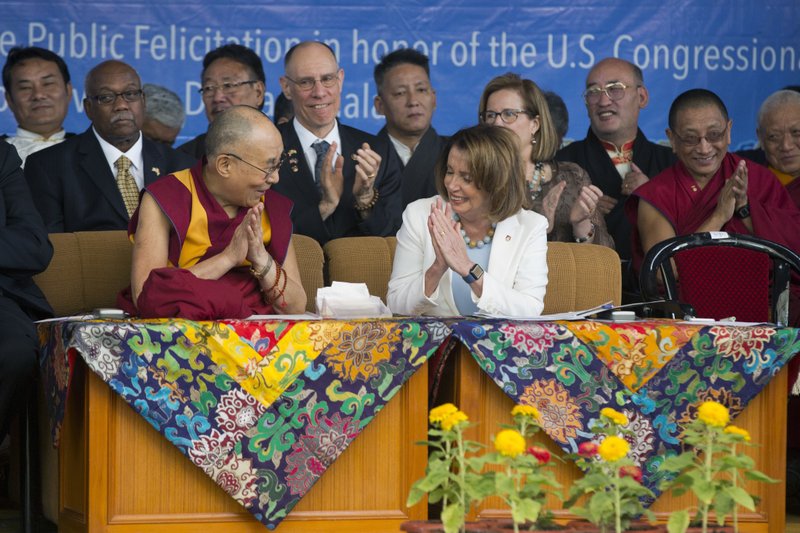DHARMSALA, India -- As President Donald Trump appears to be warming to China, a bipartisan group from the U.S. House of Representatives took aim Wednesday at one of Beijing's sore spots: Tibet.
U.S. Rep. Nancy Pelosi accused China of using economic leverage to crush Tibetan calls for autonomy. During a meeting with Tibetans and the Dalai Lama at his main temple in the Indian hill town of Dharmsala, she urged the community not to give up.
"You will not be silenced," said Pelosi, D-Calif. "The brutal tactics of the Chinese government to erase race, culture and language of Tibetan people challenges the conscience of the world. We will meet that challenge."
The visit by Pelosi and seven other U.S. representatives irritated Beijing, where a spokesman for the Foreign Ministry reiterated China's stance that the Dalai Lama is a dangerous separatist.
[PRESIDENT TRUMP: Timeline, appointments, executive orders + guide to actions in first 100 days]
"The visit by U.S. congressmen to Dharmsala and their meeting with the Dalai Lama has sent a very wrong signal to the outside world about supporting Tibetan independence, which violates the U.S. government's commitment not to support independence for Tibet," the spokesman, Geng Shuang, told reporters.
He said China had complained to the U.S. government over the matter and urged the U.S. representatives "to stop any kind of contact with the Dalai Lama, and take immediate measures to eliminate the negative impact."
But U.S. Rep. Jim Sensenbrenner, R-Wis., assured that the U.S. Congress stood in "solidarity with the cause of the Tibetan people to be free from the repression that has been put upon them for a very, very long time from Beijing."
"Without justice there is no freedom," Sensenbrenner said, noting that the U.S. Constitution has prohibited government restrictions on the free exercise of religion for more than 220 years. "Today there is no justice in Tibet for Tibetans, for their religion, for their culture, for their language, and for His Holiness The Dalai Lama. ... This is a civil-rights issue."
China says the Himalayan region has been part of the country for more than seven centuries. Many Tibetans insist they were essentially independent for most of that time. At least 148 Tibetans have set themselves on fire since 2009 to protest China's rule.
In many cases, China has offered aid packages to foreign governments on the condition that they support China's position on issues such as Tibet and Taiwan, the self-governing island that the government in Beijing has pledged to take control of, by force if necessary. Mongolia said in December that it would no longer allow visits by the Dalai Lama after a recent trip by the exiled Tibetan spiritual leader led China to suspend talks on a major loan.
"China uses its economic leverage to silence the voices of friends of Tibet," Pelosi said Wednesday. "But if we don't speak out against repression in Tibet and the rest of China because of China's economic power, we lose all moral authority to talk about human rights anywhere else in the world."
Pelosi told the gathering that she would limit her comments on China's "brutal tactics" because the Dalai Lama had "prayed for me that I would rid myself of my negative attitude about dwelling on the negative too much."
The Dalai Lama, meanwhile, said Tibetans do not need weapons in their struggle for autonomy, and again prescribed a path of nonviolence and compassion. While he has devolved political power to an elected government, the Dalai Lama is still widely revered by Tibetans as their most influential leader.
Tibetans who remain in the closely guarded region "are living in fear and anxiety. Their life is at risk, but they are still preserving our traditions," said the Dalai Lama, who fled Tibet to India in 1959 during an abortive uprising.
"We all are dedicated to the Tibetan cause but should not think of harming the Chinese people as such. We need to befriend them" and work through compassion to resolve the Tibetan issue, he said.
Many in the crowd at Wednesday's gathering in Dharmsala said they were delighted, and relieved, to see a bipartisan U.S. delegation address the Tibetan issue.
"It perhaps shows that there is huge support for Tibet in the U.S. Congress. With Trump at the helm, things are uncertain," said Internet security analyst Lobsang Gyatso, 34.
Information for this article was contributed by Louise Watt and Ashok Sharma of The Associated Press.
A Section on 05/11/2017
